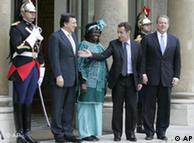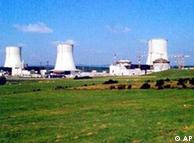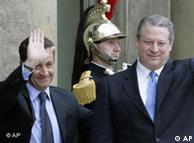Environment | 25.10.2007.d.welle
Environment | 25.10.2007
Sarkozy Promises Green Revolution for France
President Sarkozy has unveiled a raft of tax measures and investment pledges, saying they will revolutionize France's environmental policy and put the country at the forefront of the fight against global warming.
Speaking at the end of a two-day, high-profile national environment conference at the Elysee Palace attended by former US Vice President and Nobel laureate Al Gore and European Commission Head Jose Manuel Barroso, Sarkozy called for an "ecological new deal" to push France toward the vanguard of the battle against global warming.
 Bildunterschrift: Großansicht des Bildes mit der Bildunterschrift: Illustrious green circle -- Sarkozy and Barosso with Kenya's Wangar Maathai and Al Gore
Bildunterschrift: Großansicht des Bildes mit der Bildunterschrift: Illustrious green circle -- Sarkozy and Barosso with Kenya's Wangar Maathai and Al Gore
"France hasn't fallen behind, but it wants now to be in the lead," Sarkozy said at the end of the special environmental policy meeting seeking ways to slash greenhouse gas emissions and help change attitudes to the environment in society.
"The time for action has come. We have waited too long; we cannot wait any longer," he said. "France wants to be ahead, and it wants to be exemplary."
Cutting road traffic
Outlining the measures, Sarkozy said he was in favor of a moratorium on all new highways and airports as well as shifting trucks off highways and onto railroads. Road transport accounts for a quarter of French emissions.
Earlier, Jean-Louis Borloo also announced a freeze on the building of new roads and airports while consumers will be steered away from gas-guzzling cars through bonuses and penalties. Sarkozy also wants to extend France's tram and high-speed TGV train network.
Other plans include a nationwide campaign to improve energy efficiency in new and existing buildings. Single pane glass and energy wasting lightbulbs would be banned. The goal is to have 20 percent energy savings by 2010.
By 2020, all new buildings should "produce more energy than they consume," Sarkozy said, without specifying how this would be accomplished.
France a latecomer to green causes
France is widely seen to be lagging behind neighboring Germany and Scandinavian countries in promoting environmental innovation and the high-profile national environmental conference was aimed at giving the message that France intends to play catch-up.
Greenpeace estimates that France needs to slash its greenhouse gas emissions by 30 percent by the year 2030.
 Bildunterschrift: Großansicht des Bildes mit der Bildunterschrift: The measures are meant to change the way the French eat, travel and live
Bildunterschrift: Großansicht des Bildes mit der Bildunterschrift: The measures are meant to change the way the French eat, travel and live
The conference was also meant to fulfill Sarkozy's election campaign promise that his government would emphasize sustainable development. It marked the climax of three months of nationwide discussions with employers, unions and environmental groups meant to produce 15 to 20 measures changing the way the French eat, travel and live.
Controversial measures dropped
Sarkozy steered clear of a generalized "carbon tax" that environmentalists wanted and instead unveiled a raft of measures aimed at punishing polluting vehicles. Drivers who buy cars that use little gasoline will be entitled to discounts, while those who buy gas-guzzlers will have to pay extra, according to another measure.
Environmentalists' demand for an eco tax was also dropped. The French president said he would only consider such a tax if the costs to the taxpayer could be mitigated by a reduction in social security contributions
Sarkozy also scrapped controversial plans to lower the speed limit on highways and add a fuel tax for domestic flights.
Many agricultural reforms too were watered down under pressure from farming unions and the strong agricultural lobby. Sarkozy said he would suspend the planting of genetically modified (GMO) pest-resistant crops until the results of an appraisal of the issue later this year or early in 2008.
The government also said it will ban 47 highly toxic pesticides. Environmentalists wanted the frequency of pesticide treatments cut in half but Sarkozy set no deadline for that proposal.
Beyond specific proposals, Sarkozy pledged that all state projects will be examined in terms of their "climate costs," Sarkozy said.
"We can no longer consider any political project without thinking about the challenge of climate change," he said.
While Sarkozy promised that the Paris eco-summit would lead to "a revolution in our behavior, in our policies," he promised to do so without increasing the cost of living.
Sarkozy sticks to nuclear power
Sarkozy committed the government to investing 1 billion euros ($1.43 billion) over four years in alternative fuels and engine innovations.
Organic food also got a nod of support. France is Europe's biggest agricultural producer. A proposal would increase the share of organic crops from two percent to 20 percent by 2020. Furthermore, 20 percent of school meals would be organic, he said.
France's greenhouse gas emissions are low compared with other European economies because of the country's reliance on nuclear power, which accounts for more than 80 percent of electricity production.
 Bildunterschrift: Großansicht des Bildes mit der Bildunterschrift: Sarkozy has pledged to maintain France's nuclear energy capacity
Bildunterschrift: Großansicht des Bildes mit der Bildunterschrift: Sarkozy has pledged to maintain France's nuclear energy capacity
Sarkozy promised not to build any more nuclear power reactors, but said that France could not "give up this form of energy."
"We must improve our energy efficiency by 20 percent by 2020," he said. "Our sole pertinent aim is to reduce our dependency on carbon."
Gore called Sarkozy "a great friend of the people of this planet because you are providing leadership."
"We must realize that increases in global warming pollution anywhere now threaten the viability of human civilization everywhere," he said.
French lawmakers are expected to vote on Sarkozy's proposals early next year. Since the French parliament is dominated by Sarkozy's party, the initiatives are likely to pass. Activists fear lawmakers will try to back away from some of Sarkozy's more controversial measures.

Comments